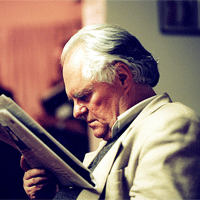By Dr. Cornelius Schnauber, Founder and Director Emeritus
In 1975, as chair of the Department of German at USC, I was invited to the United Nations as an honorary guest by the Secretary General who helped me convince the President of the Max Kade Foundation, Dr. Eric Markel, to donate two buildings to USC for use as a German Cultural Center. At that time, I was already organizing my second USC “German Semester.” In addition to major exhibitions such as ”The White Rose” exhibit from Munich and film retrospectives such as the “Oberhausen Film Festival” and the “Fred Zinnemann and Billy Wilder Retrospectives,” every German Semester hosted twenty-five prominent authors, composers, film makers, politicians, and scholars from the German-speaking countries and the United States who held seminars, lectures, workshops and public events. Among these prominent visitors were film émigrés such as Fritz Lang, Billy Wilder, Fred Zinnemann, and Paul Henreid, composers such as Boris Blacher, Paul Burkhard and Ernst Krenek, painters such as Georg Eisler, and authors Fritz Hochwälder, Hermann Kesten, Peter Handke, Hilde Spiel, Frederick Kohner, Curt Siodmak, Heiner Müller, Friedrich Torberg, Jurek Becker, Pavel Kohout, among many others, and influential cabaret artists such as Helmut Qualtinger and George Kreisler.
In 1984 when I stepped down as chair of the Department of German, I changed the name of the German Center to the “Max Kade Institute for Austrian-German-Swiss Studies,” thus establishing it as an Independent Research Unit at USC. We used one of the donated German Center buildings as a place for lectures, seminars, performances and informal social gatherings, and the other building was meant to be designated as a dormitory for students from the German-speaking countries. As the institute’s director, I continued to focus on bringing in prominent guest speakers, scholars, artists, and politicians several of whom, including Billy Wilder, Ernst Krenek, and Gottfried Reinhardt, had already participated in the German Semesters of 1973, 1976, and 1981. The Institute also developed its own archive and library around its main focus of exile studies. We collected documents by and about exiled people mainly from the German-speaking countries between 1933 and 1949. However, in addition to its concern with exile studies, the Max Kade institute also organized international conferences on the history of Austria, Switzerland and Germany, and this again with leading politicians, scholars, authors and artists, including historians such as Hans Mommsen and documentary film makers such as Errwin Leiser, Eberhard Fechner and Egon Monk. Noteworthy participants in these programs were also the presidents of Switzerland and Austria and the Chancellor of Germany.
Another of the Institute’s main foci has also been the relationship of the German-speaking countries to their Jewish populations, past and present. Indeed, I worked with Los Angeles Jewish organizations to develop the “German-Jewish Dialogue of the Second Generation,” and I became its co-chairman along with Morris Kagan. The dialogue continued for over 20 years. Each semester it consisted of seven sessions, and it closed after the second session so that the discussions would be confidential and therefore more open for the initial participants. One session each year was open to the public and featured prominent guest speakers such as Bruno Bettelheim, Saul Friedlander and Hildegard Hamm-Brücher .
Another important development was the “Swiss-Writer in Residence” program which brought in a Swiss author for a semester each year. Based at the institute, these authors worked with students and the public. Participating writers included such great authors as Friedrich Dürrenmatt, Hugo Loetscher, Eugen Gomringer, Maximilian Schell, Walter Vogt, Adolf Muschg or Daniel Odier.
The erstwhile “German Center” of USC’s Department of German, and later the Max Kade Institute for Austrian-German-Swiss Studies, has worked together with such important sponsors as the Goethe Institut in Munich, Pro Helvetia in Zurich, The Deutsche Forschungsgemeinschaft in Bonn, the Deutscher Akademischer Austauschdienst in Bonn and Berlin, the Konrad Adenauer Stiftung in Bonn and the governments of the German-speaking countries as well as the City Council of Los Angeles.

Director Emeritus and Founding Director: Cornelius Schnauber (1939-2014)